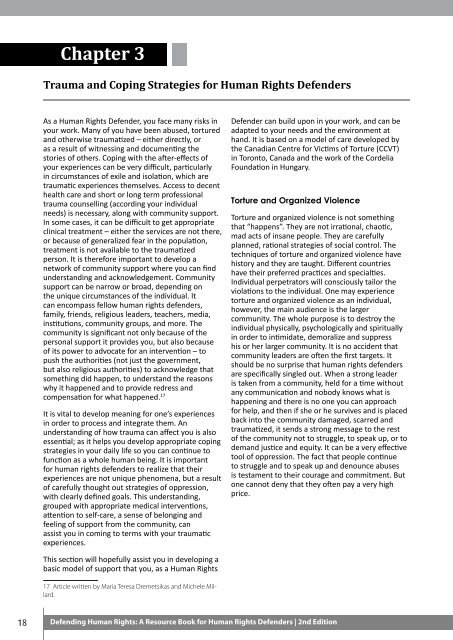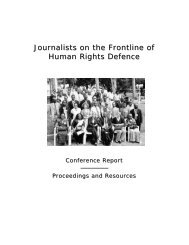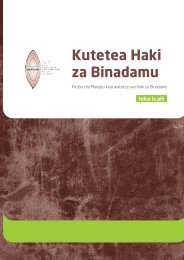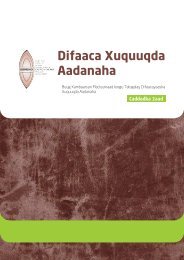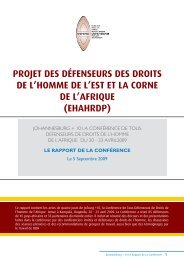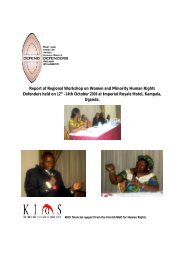Defending Human Rights: A Resource Book for Human
Defending Human Rights: A Resource Book for Human
Defending Human Rights: A Resource Book for Human
You also want an ePaper? Increase the reach of your titles
YUMPU automatically turns print PDFs into web optimized ePapers that Google loves.
Chapter 3<br />
Trauma and Coping Strategies <strong>for</strong> <strong>Human</strong> <strong>Rights</strong> Defenders<br />
As a <strong>Human</strong> <strong>Rights</strong> Defender, you face many risks in<br />
your work. Many of you have been abused, tortured<br />
and otherwise traumatized – either directly, or<br />
as a result of witnessing and documenting the<br />
stories of others. Coping with the after-effects of<br />
your experiences can be very difficult, particularly<br />
in circumstances of exile and isolation, which are<br />
traumatic experiences themselves. Access to decent<br />
health care and short or long term professional<br />
trauma counselling (according your individual<br />
needs) is necessary, along with community support.<br />
In some cases, it can be difficult to get appropriate<br />
clinical treatment – either the services are not there,<br />
or because of generalized fear in the population,<br />
treatment is not available to the traumatized<br />
person. It is there<strong>for</strong>e important to develop a<br />
network of community support where you can find<br />
understanding and acknowledgement. Community<br />
support can be narrow or broad, depending on<br />
the unique circumstances of the individual. It<br />
can encompass fellow human rights defenders,<br />
family, friends, religious leaders, teachers, media,<br />
institutions, community groups, and more. The<br />
community is significant not only because of the<br />
personal support it provides you, but also because<br />
of its power to advocate <strong>for</strong> an intervention – to<br />
push the authorities (not just the government,<br />
but also religious authorities) to acknowledge that<br />
something did happen, to understand the reasons<br />
why it happened and to provide redress and<br />
compensation <strong>for</strong> what happened. 17<br />
It is vital to develop meaning <strong>for</strong> one’s experiences<br />
in order to process and integrate them. An<br />
understanding of how trauma can affect you is also<br />
essential; as it helps you develop appropriate coping<br />
strategies in your daily life so you can continue to<br />
function as a whole human being. It is important<br />
<strong>for</strong> human rights defenders to realize that their<br />
experiences are not unique phenomena, but a result<br />
of carefully thought out strategies of oppression,<br />
with clearly defined goals. This understanding,<br />
grouped with appropriate medical interventions,<br />
attention to self-care, a sense of belonging and<br />
feeling of support from the community, can<br />
assist you in coming to terms with your traumatic<br />
experiences.<br />
Defender can build upon in your work, and can be<br />
adapted to your needs and the environment at<br />
hand. It is based on a model of care developed by<br />
the Canadian Centre <strong>for</strong> Victims of Torture (CCVT)<br />
in Toronto, Canada and the work of the Cordelia<br />
Foundation in Hungary.<br />
Torture and Organized Violence<br />
Torture and organized violence is not something<br />
that “happens”. They are not irrational, chaotic,<br />
mad acts of insane people. They are carefully<br />
planned, rational strategies of social control. The<br />
techniques of torture and organized violence have<br />
history and they are taught. Different countries<br />
have their preferred practices and specialties.<br />
Individual perpetrators will consciously tailor the<br />
violations to the individual. One may experience<br />
torture and organized violence as an individual,<br />
however, the main audience is the larger<br />
community. The whole purpose is to destroy the<br />
individual physically, psychologically and spiritually<br />
in order to intimidate, demoralize and suppress<br />
his or her larger community. It is no accident that<br />
community leaders are often the first targets. It<br />
should be no surprise that human rights defenders<br />
are specifically singled out. When a strong leader<br />
is taken from a community, held <strong>for</strong> a time without<br />
any communication and nobody knows what is<br />
happening and there is no one you can approach<br />
<strong>for</strong> help, and then if she or he survives and is placed<br />
back into the community damaged, scarred and<br />
traumatized, it sends a strong message to the rest<br />
of the community not to struggle, to speak up, or to<br />
demand justice and equity. It can be a very effective<br />
tool of oppression. The fact that people continue<br />
to struggle and to speak up and denounce abuses<br />
is testament to their courage and commitment. But<br />
one cannot deny that they often pay a very high<br />
price.<br />
This section will hopefully assist you in developing a<br />
basic model of support that you, as a <strong>Human</strong> <strong>Rights</strong><br />
17 Article written by Maria Teresa Dremetsikas and Michele Millard.<br />
18<br />
<strong>Defending</strong> <strong>Human</strong> <strong>Rights</strong>: A <strong>Resource</strong> <strong>Book</strong> <strong>for</strong> <strong>Human</strong> <strong>Rights</strong> Defenders | 2nd Edition


